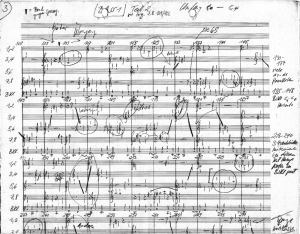Entartung
Naturalness and functional principles in separate pieces
1976/84 (open)
Electro Instrumental Music
For bass clarinet, sound analyzer and delay machine
With the movements Abart and Entart
‘Abart’ shows my reaction to natural sound processes, to a romantic harmony. This currently fashionable, avant-garde interpretation of historical review, the resulting musical form, the addiction to unity and euphony, seems to be a solution in late capitalism from unequal power relations and technological synchronisation. But this mindset formulates a lie and a fallacy, as it seems to solve problems short-sightedly and in the short term, but inhibits social developments by ignoring them and does not respond to them constructively. ‘Abart’ means to fasten the naturalness of man. However, it is finally deviant and condemned to waste because it pretends to be solutions.
‘Entart’, my action, formulates music according to functional principles. Music that fulfills a function by recognizing social and thus cultural realities and using them, uses tonality and atonality to the same extent as it defines the law of the overtone series. Individuality is excluded. The composer considers the logical process alone. Logic is thus not to be seen in the field of tension between ratio and emotion, but formulates its own aesthetic ideas. In a time in which we are on the leap from an industrial to an information society, dealing with the computer should also be a prerequisite in music.
After many technical problems and the computer falling out of the airplane in Tokyo and further transport problems before the premiere and during the tour, the performance of Harry Sparnaay was only partially realized. Only ‘Abart’ could take place. Afterwards ‘Entartung’ was theoretically developed further. A new performance did not take place. There are only sporadic sound recordings of the rehearsals in Rotterdam (The Netherlands).
“If the greatest masters of music have felt and created in tonality and from the quite obviously Germanic element of the triad, then we have a right to brand as dilettantes and charlatans those who want to throw these principles of sound overboard and improve or extend them by any combination of sounds, in reality devalue them.”
(Councillor of State, Dr. Hans Severus Ziegler, Entartete Musik, eine Abrechnung, Düsseldorf, 1938)
Entartung 2
In autumn 1984, at the invitation of the Goethe Institute, the premiere of the composition Entartung 1 took place in Tokyo and Seoul. Although later the European premiere in Budapest was a success, it was clear to me that the composition Entartung 1 was coherent in its basic idea, but the musical and also technical elaboration was not right. Technically, the delay device did not work well, the synchronicity between the computer and the bass clarinettist was not guaranteed. I had only fragmentarily achieved the conversion of the sound programmes into a musically responsible form. That is why the composition Entartung 2 was written in 1985.
© Michael Fahres, August 2010

